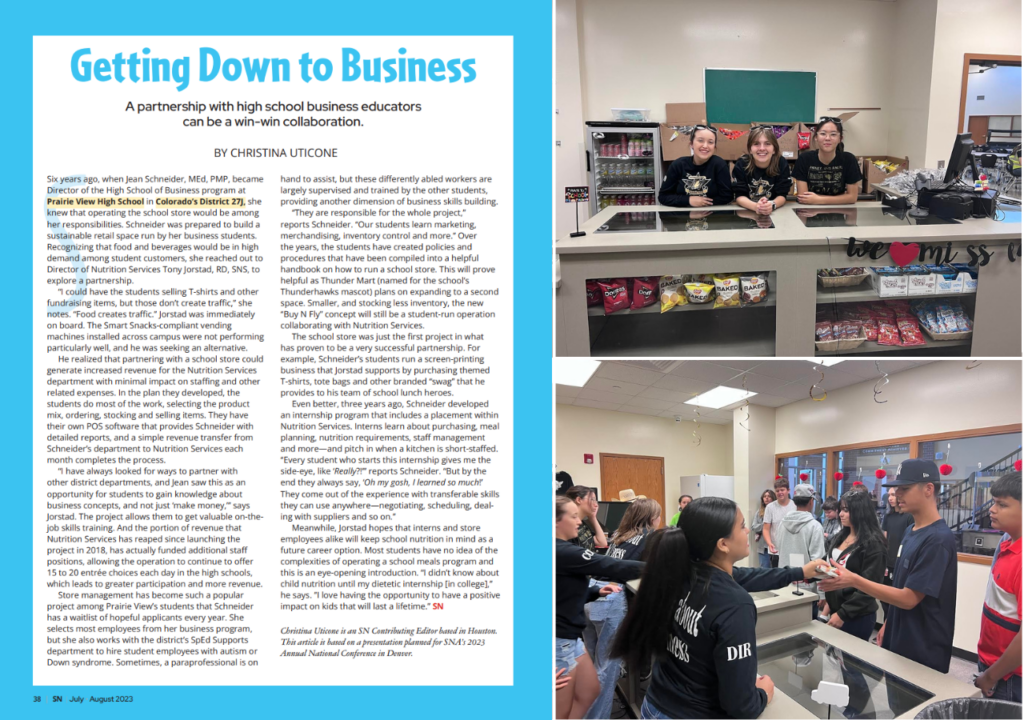
Running a school business is a highlight of the High School of Business™ program. It’s also a great opportunity to collaborate with your local community and other district departments. Prairie View High School in Colorado was featured in the July/August 2023 issue of School Nutrition magazine for their school store’s partnership with nutrition services.
While building Thunder Mart, a retail store run by her students, HSB teacher Jean Schneider realized that food and beverages drives retail traffic. When approached with the idea, the nutrition services department saw the school store as a great alternative to the Smart Snacks-compliant vending machines across campus that were not performing well among students. In the plan they developed, students do most of the work, select the product mix, order, stock, and sell items. The partnership helped generate increased revenue for the nutrition services department with minimal impact on staffing and other related expenses. For students, this partnership helped them learn about marketing, merchandising, inventory control, and more! Read the transcribed article below:
Getting Down to Business
A partnership with high school business educators can be a win-win collaboration.
By Christina Uticone
Six years ago, when Jean Schneider, MEd, PMP, became Director of the High School of Business program at Prairie View High School in Colorado’s District 27J, she knew that operating the school store would be among her responsibilities. Schneider was prepared to build a sustainable retail space run by her business students. Recognizing that food and beverages would be in high demand among student customers, she reached out to Director of Nutrition Services Tony Jorstad, RD, SNS, to explore a partnership.
“I could have the students selling T-shirts and other fundraising items, but those don’t create traffic,” she notes. “Food creates traffic.” Jorstad was immediately on board. The Smart Snacks-compliant vending machines installed across campus were not performing particularly well, and he was seeking an alternative.
He realized that partnering with a school store could generate increased revenue for the Nutrition Services department with minimal impact on staffing and other related expenses. In the plan they developed, the students do most of the work, selecting the product mix, ordering, stocking and selling items. They have their own POS software that provides Schneider with detailed reports, and a simple revenue transfer from Schneider’s department to Nutrition Services each month completes the process.
“I have always looked for ways to partner with other district departments, and Jean saw this as an opportunity for students to gain knowledge about business concepts, and not just ‘make money,’” says Jorstad. The project allows them to get valuable on-the-job skills training. And the portion of revenue that Nutrition Services has reaped since launching the project in 2018, has actually funded additional staff positions, allowing the operation to continue to offer 15 to 20 entrée choices each day in the high schools, which leads to greater participation and more revenue.
Store management has become such a popular project among Prairie View’s students that Schneider has a waitlist of hopeful applicants every year. She selects most employees from her business program, but she also works with the district’s SpEd Supports department to hire student employees with autism or Down syndrome. Sometimes, a paraprofessional is on hand to assist, but these differently abled workers are largely supervised and trained by the other students, providing another dimension of business skills building.
“They are responsible for the whole project,” reports Schneider. “Our students learn marketing, merchandising, inventory control and more.” Over the years, the students have created policies and procedures that have been compiled into a helpful handbook on how to run a school store. This will prove helpful as Thunder Mart (named for the school’s Thunderhawks mascot) plans on expanding to a second space. Smaller, and stocking less inventory, the new “Buy N Fly” concept will still be a student-run operation collaborating with Nutrition Services.
The school store was just the first project in what has proven to be a very successful partnership. For example, Schneider’s students run a screen-printing business that Jorstad supports by purchasing themed T-shirts, tote bags and other branded “swag” that he provides to his team of school lunch heroes.
Even better, three years ago, Schneider developed an internship program that includes a placement within Nutrition Services. Interns learn about purchasing, meal planning, nutrition requirements, staff management and more—and pitch in when a kitchen is short-staffed. “Every student who starts this internship gives me the side-eye, like ‘Really?!’” reports Schneider. “But by the end they always say, ‘Oh my gosh, I learned so much!’ They come out of the experience with transferable skills they can use anywhere—negotiating, scheduling, dealing with suppliers and so on.”
Meanwhile, Jorstad hopes that interns and store employees alike will keep school nutrition in mind as a future career option. Most students have no idea of the complexities of operating a school meals program and this is an eye-opening introduction. “I didn’t know about child nutrition until my dietetic internship [in college],” he says. “I love having the opportunity to have a positive impact on kids that will last a lifetime.”